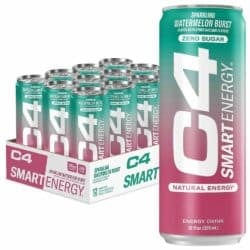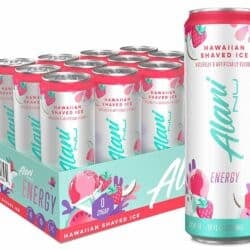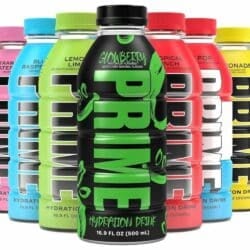Is Aspire Energy Drink Healthy (Nutrition Pros and Cons)?
In this blog post, I’ll review the question of whether Aspire Energy Drink is healthy or not? Find out what this product’s nutrition pros and cons are, plus some better options to consider.

Aspire Energy Drink Facts
Aspire Energy Drink is an energy drink produced by Aspire Brands LLC. This product caters to people who want a convenient way to have more focus and energy.
Aspire Energy Drink is available in 12 fl oz cans and can be purchased in 12 and 24 packs and in variety packs that include the following flavors:
- Raspberry+Acai
- Mixed Berry
- Sweet Cherry
- Strawberry Watermelon
- Mango Lemonade
- Apple+Acai
- Cranberry
The nutrition label on Aspire Energy Drink lists zero calories, zero sugar, and minimal carbohydrates.
Ingredients include carbonated water, caffeine derived from green tea and guarana seed extract, sodium citrate, natural flavor, calcium lactate, and B vitamins such as vitamin B-3, vitamin B-6, and vitamin B-12. Aspire Energy Drink may incorporate other compounds like L-theanine, an amino acid.
Aspire Energy Drink Ingredients
Let’s examine some of the main ingredients in Aspire Energy Drink and what they mean for your health.
Natural flavors
Natural flavoring in food products is not scientifically defined, giving manufacturers leeway to classify anything added to a product as “natural” even if an element of it is not entirely fit for human consumption.
Since Aspire Energy Drinks nutrition labels don’t specify the precise source or extraction process of its natural flavors, it’s unclear whether the “natural” flavoring was extracted using potentially unhealthy techniques, like enzyme-assisted extraction, which may involve solvents and high temperatures.
Because of the lack of definition for what “natural” means, even genetically engineered crops could be labeled as such, further complicating matters when it comes to consumer choices.
Sucralose
Sucralose, an artificial sweetener, undergoes extensive processing and chlorination, rendering it unsuitable for human consumption. Despite FDA approval as a food additive, there are concerns about its potential health effects, prompting many health-conscious individuals to avoid this harmful additive.
Since sucralose offers a sweetness level approximately 600 times greater than sugar, it means minimal usage for sweetening, but prolonged consumption may lead to several health complications.
Consuming sucralose has been linked to toxicity, inflammation, and potentially contributing to obesity and diabetes. Its impact on reducing beneficial gut bacteria can disrupt the body’s gut microbiome, resulting in significant digestive issues.
For those who continue to consume foods or beverages containing sucralose, it is advisable to exercise moderation or avoid it altogether to prevent potential health risks.
Sodium Citrate
Sodium citrate is generally considered safe but may cause specific health problems if consumed excessively or by individuals with particular sensitivities.
Food manufacturers commonly use this additive as an acidity regulator and flavor enhancer in food and beverage products.
Excessive intake may lead to increased sodium levels in the blood, potentially causing hypertension or worsening existing high blood pressure. Individuals with kidney issues or those on restricted sodium diets should be cautious, as sodium citrate can contribute to electrolyte imbalances.
Calcium Lactate
Calcium lactate is a common food additive. Manufacturers use it to fortify products with calcium, an essential mineral for bone health and muscle function. However, excessive calcium intake from supplements or fortified foods may lead to hypercalcemia, characterized by elevated calcium levels in the blood.
Symptoms of hypercalcemia include nausea, vomiting, constipation, abdominal pain, and muscle weakness. Additionally, individuals with impaired kidney function may be at higher risk of developing complications from excessive calcium intake.
Guarana Seed Extract
Guarana seed extract is a popular natural source of caffeine, and when used in food and beverage products, it offers several health benefits, including improved focus and more energy. It can also help with weight loss.
However, it’s essential to stick to a daily limit of a maximum of 400mg of caffeine to avoid potential side effects.
For people sensitive to caffeine or those with anxiety disorders, even smaller amounts of it can lead to uncomfortable side effects such as rapid heart rate, jitteriness, anxiety, insomnia, and gastrointestinal discomfort.
Sodium
Consuming 55 mg of sodium in an energy drink product may not pose significant health concerns for most individuals, as it represents a relatively small amount compared to the daily recommended limit of 2,300mg for adults. However, for individuals with certain health conditions, such as hypertension or heart disease, monitoring any amount of sodium is crucial.
Excessive sodium consumption can contribute to high blood pressure and increase the risk of cardiovascular problems. Individuals with kidney issues or those on restricted sodium diets should be cautious about consuming products with added sodium.
Nutrition Pros
Aspire Energy Drink is free of sugar and calories and contains natural caffeine from guarana seed extract.
In moderation, caffeine has potential health benefits, such as increasing energy levels, promoting weight management, boosting athletic performance, and improving mood.
Nutrition Cons
Aspire Energy Drink contains 80mg of caffeine – nearly as much as a regular serving of brewed coffee. People sensitive to caffeine should avoid consuming this product as it can cause a jittery feeling and other potential health issues.
It also contains sucralose, a highly processed ingredient that could cause several health-related issues.
Aspire Energy Drink also contains 55mg of sodium. People on a sodium-restricted diet or who have sensitivities to sodium should avoid this product or consume it in moderation.
Lastly, Aspire is expensive compared to more basic energy-boosting practices such as getting a good night’s sleep, staying hydrated, and practicing other basic healthy lifestyle techniques.
FAQs
While Aspire Energy Drink is marketed as a healthier alternative to other energy drink brands because it contains some natural ingredients and a lower sugar content, it still contains caffeine and other stimulating compounds.
Excessive caffeine consumption can cause jitteriness, increased heart rate, anxiety, insomnia, and gastrointestinal discomfort. Additionally, people with underlying heart conditions, high blood pressure, or anxiety disorders may be more susceptible to these side effects.
Aspire Energy Drink contains a high amount of sodium, which could cause health problems such as high blood pressure, hypertension, and other cardiovascular-related issues when consumed in excess or by people observing a sodium-restricted diet for health reasons.
Aspire Energy Drink contains sucralose. Sucralose may affect people with diabetes by reducing insulin sensitivity and increasing blood sugar and insulin levels. People with diabetes should avoid consuming Aspire Energy Drink or speak to a healthcare professional.
Don’t Miss These Energy Drink Reviews!
Conclusions
While Aspire Energy Drink contains some natural ingredients and lower sugar content compared to other energy drinks, it still poses potential risks due to its caffeine content, high sodium levels, and because it contains sucralose.
If you consume this product, do so in moderation and carefully consider your health factors. If you feel you need more energy overall, eating real food and getting enough sleep to maintain natural energy is better. Otherwise, have a cup of green tea or cup of coffee for an energy boost.
Don’t forget to join my newsletter list to get exclusive clean eating recipes and tips. The newsletter is 100% free with no spam; unsubscribe anytime.
About the Author: Carrie Forrest has a master’s degree in public health with a specialty in nutrition. She is a top wellness and food blogger with over 5 million annual visitors to her site. Carrie has an incredible story of recovery from chronic illness and is passionate about helping other women transform their health. Send Carrie a message through her contact form.
Note: this post is for informational purposes only and is not intended as medical advice. Please consult your healthcare provider for recommendations related to your individual situation.




















